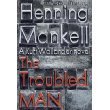A Master Class in Crime Noir
We write. Therefore we read.
Or at least we should. Especially after we become acquainted with the technical nuts and bolts of story architecture… once you know this stuff you can't help but see it at work within successful stories — both books and movies — in a way that jumps out at you.
And, serves as a model of what works. No matter what your process, what works is always the goal.
The following review appeared this week in The Oregonian newspaper, used by permission. The novel is, as the title suggests, an example worth studying.
We're lucky that way. We get to study and enjoy a good book at the same time.
"The Troubled Man," By Henning Mankell… A Review by Larry Brooks
It's good to be Swedish these days. Especially if you're an author of dark mystery thrillers.
Such is the global fallout from a breakout series that dominates both the bestseller and box office charts, as fueled by the iconic Stieg Larson trilogy and their on-screen adaptations. With all three sub-titled films being redone by U.S. writers and directors, this phenomenon will continue over the next few years, do doubt giving even more Swedish writers their shot at a hungry U.S.-based readership.
But in case you thought the current buzz about Swedish noir began and ended with the late Stieg Larson and his heroine with the Dragon Tattoo, this is about as true as the current equity in American mysteries belonging entirely to Michael Connelly, an assumption which might ruffle the feathers of writers like Dashiel Hammet, Ellery Queen or even Ross Macdonald. Because like Connelly, Larson had his way paved by a Swedish literary institution, in this case one who continues to write what crime lit afficianados recognize to be among the finest the genre has ever produced.
His name is Henning Mankell, best known stateside for last year's The Man From Beijing. Mankell (the son-in-law of film legend Ingmar Bergman) and his quite Harry Bosch-like protagonist, Kurt Wallander, is a global legend known not only for his multi-million selling novels and his father-in-law, but also for his work as a playwright, screenwriter, children's author and philanthropist.
His newest novel, The Troubled Man, is the final chapter in the Wallander series, coming a decade after the latest of its nine predecessors.
Reading Mankell is a study in the marriage of characterization and the sub-text of plot. The latter is a tasty resurrection of cold war intrigued based on a real-life government cover-up (not unlike what Nelson Demille tried to pull off in 2007's Night Fall), complete with spies, cyanide pills, secrets taken to the grave by corrupt leaders and a hero who risks all because he has to know the truth to allow himself to view his diminishing career as having been meaningful. Throw in a delayed mid-life crisis, a daughter with a mind of her own and the emerging sense of his own shuffling off to the pasture of a desk job, and you've got a story that rings deeper and hinges on personal stakes unlike most reads from this end of the shelf.
While the plot alone would compel a reader to forfeit a few early nights to experience this web of intrigue connecting in unexpected and satisfying ways, it is the voice of the author through his hero and the illumination of layers of life in a thankless profession that suck the reader into a delicious abyss of urgency battling with hopelessness, a rationalization of risk versus a reward already buried under a false headstone.
Mankell isn't going away, he's got more literary fight left in him than does his retiring hero, Wallander. But if you want to catch the segue from one Henning Mankell era to the next, now is the time to hop on the Kurt Wallander train and lose yourself in a story that envelopes as it challenges. And if you still aren't sure who this guy is, just keep an eye on the best seller lists over the next few months, because you're certain to see him there next to the title of this stellar work.
Larry Brooks' latest book is "Story Engineering: Mastering the Six Core Competencies of Successful Writing," published in February by Writers Digest Books.
A Master Class in Crime Noir is a post from: Larry Brooks at storyfix.com




